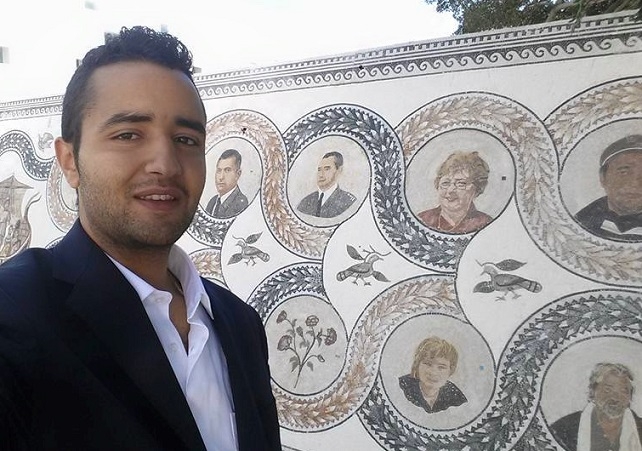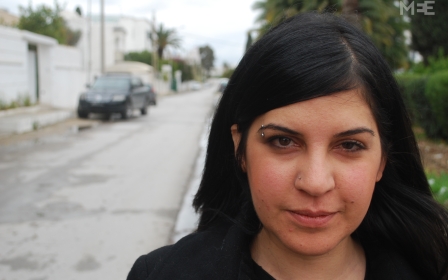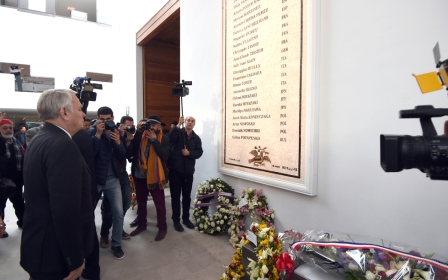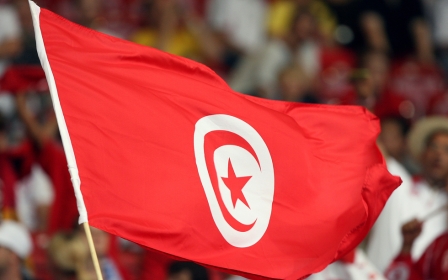The Bardo Museum's forgotten hero

TUNIS – A year ago, 23-year-old Alaa Eddine Hamdi saved as many as 40 tourists during the shooting at the Bardo Museum here in Tunisia’s capital.
Hamdi was working as a security guard at the museum, where he had spent long afternoons as a child while his father repainted the ceilings and whose relics he has now learned by heart. He was about to take his lunch break when he heard gun shots and fled for his life - and ended up saving a room full of tourists in attacks that killed 21 others.
It is a feat for which he says has yet to receive recognition from the museum or the government.
A year later, Hamdi is in despair. In recent months, he has had to become the breadwinner of his family, and he now works at construction sites because the museum hasn’t paid him since last December.
His courage during the attack has also returned to haunt him. In his neighbourhood, most young people, he said, have left for Syria to fight for the Islamic State militant group. Others who have stayed regularly threaten him for saving the lives of Western tourists.
“All I want to do is set myself on fire in front of the Bardo because what I’ve done there to save people has been useless,” he told Middle East Eye last month. Later, he said he was just depressed, and he no longer wanted to kill himself.
But as commemoration events have been held in recent weeks aimed at restoring the image of the museum and drawing back tourists, Hamdi’s story provides an alternative account of the attack’s aftermath.
The room key
It was midday on 18 March 2015, when Hamdi was surveying the mosaics rooms of the museum, when he heard the shots ring out. “I immediately recognised the sound of bullets. It was too loud to be firecrackers,” he told MEE.
At first, he thought there was an attack on the parliament, which shares its walls with the museum. But soon, Hamdi said, he saw tourists running in the nearby rooms and then bursts of gunfire went off.
Hamdi, who had only trained in first aid a week before, tried to flee, but as he headed towards the museum’s Dougga room, featuring the famous Triumph of Neptune mosaic, he found around 40 terrified men, women, and children. Luckily, he had the key to the room.
“The museum has no secret for me,” he said. “I was able to barricade ourselves.”
Hamdi said he asked the visitors to make as little noise as possible. Then their wait began. After a half hour, with many of the tourists resting on the ground, a knock came at the Dougga door. An old man stood in front of Hamdi, covered in blood.
“Please, help me, my wife is dying,” the old man cried.
As Hamdi and others went to find his wife, he saw the bodies of tourists and one anti-terror brigade lieutenant.
“There was blood and dead people everywhere,” he said. “I took the hand of the man and asked him to come back with me to the room where the others were waiting, but he didn’t want to.”
“He told me: ‘I prefer dying with my wife’. I left him because I did not know if the terrorists were still there,” Hamdi said.
He returned to the room, checked on the visitors and locked them in again, then ran to look for help even while the attackers were still on the loose and shooting at tourists.
In the general panic, police officers could have shot Hamdi, mistaking him for one of the assailants. But taking a secret way, Hamdi found the security forces, led them to the room where CCTV videos were screened and then he helped them to identify the attackers. The police launched an attack and the two assailants were killed.
Nightmares
In the aftermath of the attack, Hamdi said, his life changed. He was questioned for 12 hours by the Tunisian police, and then he was carried away by a media tide which unfurled across the country. Interviewed by foreign media, he had a moment of glory in the spotlight.
Yet every night the nightmares of that day came back to haunt him. “I was seeing this old man that I had not been able to help, and all that blood,” he said.
Spending time with his father, a construction painter who told Hamdi stories as he repainted the museum’s ceilings and other decorations, the museum had been more to him than just a job.
“I learnt to love this place and the history of its rooms when I started working there,” he said.
Hamdi started work at the museum when he was 19, guarding its walls but with his headphones in his ears. He said he didn’t really understand why tourists spent hours in front of its ceramics and sculptures.
But one day, curiosity took over, and Hamdi started observing and doing research. Soon he knew each bit and piece of the museum by heart.
“I learnt the history of my country thanks to the museum, from Hannibal to Carthage. I got so passionate about it that during the summer I complemented my salary by working as a tourist guide for visitors, and I even accompanied them to other archaeological sites,” he said.
By meeting foreigners, he also started to love languages, learning Italian to get to know a girl better, then English, and now he studies Russian in a cultural centre of Tunis.
“It costs me 400 dinars [about $200] per year. I pay my lessons with the money I earn on construction sites,” he said.
For three years before the attack, Hamdi had been employed by the museum on the basis of a temporary status called "Title 2 Worker". Without a contract, Hamdi said, he earned around $100 per month and was not eligible for payslips or social benefits.
“There are around 20 people employed on that basis at the Bardo. It is almost illicit work because we have no traceability of our payments. Sometimes we even don’t get paid,” he said.
When the museum reopened two weeks after the attack, Hamdi said the minister of culture promised that he would be given recognition for his action, and he hoped his work status would change.
“I believed that my situation would eventually be regularised, that I could have a real employment contract,” he said.
But employment at the museum is controlled by the Agency for the Valorisation of Heritage and the National Heritage Institute, so his former employer has seemed unable to straighten out the payment problem and Hamdi seems to be condemned to job insecurity.
Worse, he now fears he will not be able to work for the Bardo after his various appearances in the Tunisian media to denounce his lack of status.
It’s a situation that has become even more desperate since his father lost the use of his legs and Hamdi has had to find the resources to feed his family, including his mother, his 20-year-old brother and 16-year-old sister.
In recent weeks, Hamdi was interviewed on the Attounissia TV channel along with Minister of Culture Sonia Mbarek. During the interview, he said he hadn't been paid for four months. Mbarek said she was trying to resolve the issue and had met with some of the employees. She said she couldn't, however, make any promises.
A Ministry of Culture official told MEE that the issue of payments to Hamdi and others would be solved as soon as possible, even though it falls under the responsibility of the finances ministry, he said.
“These types of contracts are like seasonal-type contracts. There might have been administrative slowness," said the spokesperson, who said the ministry will host 18 Bardo employees during Heritage Day celebrations next month.
“They will be decorated and honoured by the minister,” he said.
Refuge
It is not only the state that has refused to show him gratitude: Hamdi said he now finds himself threatened on a daily basis in his north Tunis neighbourhood of Hay Ettadhamen.
“Many radical Salafists have heard that I have saved tourists. I’ve received threats and intimidations from them,” he said.
Trying to avoid undesirable encounters, he has spent several days at friend’s houses, but can no longer bear the permanent fear he feels when he leaves home - and confesses he doesn’t have many friends left in his neighbourhood.
Most young people, he said, have left for Syria to join the Islamic State group, now estimated to have up to 5,000 Tunisians, according to government authorities.
One of Hamdi’s last and only refuges is the historian Abdelaziz Belhodja, who published a book on Hannibal Barca, the Carthaginian hero and historical figure of Tunisia, in 2011.
“Alaa is an intelligent boy who likes learning. He is courageous and aware - despite his young age - of everything that we lack here in Tunisia to revive our grandeur,” Belhodja told MEE.
For Hamdi, despite these daily difficulties, Hannibal remains a model, a reference. He even wears a pendant engraved with Hannibal’s name.
But even if Hamdi now knows the history of his country by heart, he said has no more illusions about his future.
“I love my country, but I can’t stand this situation,” he said. “I don’t understand why it is so difficult to provide me with a normal contract.”
Translation from MEE French: http://www.middleeasteye.net/fr/reportages/le-h-ros-maudit-du-bardo-1920736199
New MEE newsletter: Jerusalem Dispatch
Sign up to get the latest insights and analysis on Israel-Palestine, alongside Turkey Unpacked and other MEE newsletters
Middle East Eye delivers independent and unrivalled coverage and analysis of the Middle East, North Africa and beyond. To learn more about republishing this content and the associated fees, please fill out this form. More about MEE can be found here.




